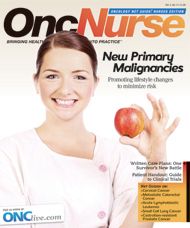Written Care Plans for Every Cancer Patient: A Colorectal Cancer Survivor's New Battle
When Suzanne Lindley was 31 years of age, she received a diagnosis of stage IV colon cancer and was informed that she had 6 months to live. Chemotherapy, both the oncologist and surgeon told her, had severe side effects that were not worth the likely benefit. They suggested Lindley go home and put her personal affairs in order. That was 10 years ago.
When Suzanne Lindley was 31 years of age, she received a diagnosis of stage IV colon cancer and was informed that she had 6 months to live. Chemotherapy, both the oncologist and surgeon told her, had severe side effects that were not worth the likely benefit. They suggested Lindley go home and put her personal affairs in order. That was 10 years ago.
Lindley was too determined a person just to go home and follow the doctor’s orders. No one had given her a written care plan—a document that “would have changed the whole course” of her disease—so she sought out alternate opinions and treatment options largely on her own. “In the beginning I was on a wing and a prayer,” she recalled. “A care plan would have provided me with some guidance. It would have given me information that I wouldn’t have had to go find out for myself.”
Over the years, Lindley has had numerous surgeries and suffered many treatment-related adverse effects. She has received care at several facilities from at least a dozen different physicians. Yet, no official summary of all the treatment she has received in the past 10 years exists. The only comprehensive medical record is the one Lindley compiled herself, which fills four 3-inch binders. In addition to a written care plan, having a complete medical record is critical, Lindley said. At one point, she almost lost a leg because of a drug interaction that could have been avoided had a written care plan been in place.
“When you take that care plan to the next doctor, either for follow-up or continued care, they’ve got— right in front of them—comprehensive information that details everything,” said Lindley, noting that a concrete plan helps empower patients. “It helps you find your direction.” She said it also ensures good management, improves communication between patient and physician, and allows the patient to participate in decision-making. “I think it’s very important that the patient knows, okay, if I have external beam therapy right now, it may prevent me from having different procedures in the future. Or, if I take Avastin, which decreases the blood flow to the tumor, it might preempt me from having chemoembolization, because that treatment uses the blood supply to the liver to deliver the treatments,” Lindley explained.
So why aren’t written care plans the rule rather than the exception? After all, we have written plans for issues that are not life and death, such as arranging mobile phone service or configuring the plays in a football game. Lindley believes many healthcare providers do not view written care plans as a necessity; they may feel the time spent putting one together costs more than what is gained. Lindley argues that, in the end, a written care plan will save time and lives.
The National Coalition for Cancer Survivorship (NCCS) agrees. NCCS suggests developing survivorship care plans even before treatment begins. NCCS says these plans should describe the patient’s cancer diagnosis, outline goals of proposed treatments and anticipated immediate and long-term side effects, detail information on possible clinical trials, and provide a treatment summary and follow-up plan. Lindley has been working closely with NCCS on the Comprehensive Cancer Care Improvement Act, which includes a requirement that every cancer patient receive a written care plan.
Lindley emphasized the importance of patients becoming active participants in their care. “The physician may not be looking at things from the same perspective as the patient,” she explained. “Instead of just saying, ‘This isn’t going to work,’ the doctor might want to consider looking at what can be gained. Three months may not mean much to the physician, but for me, as a patient, it might get me to my daughter’s graduation.”
Asked to imagine what she might have changed in her 10-year journey as a colorectal cancer survivor, Lindley said had she possessed a care plan, she would have changed direction about a dozen times based on information she and her doctors would have had at their fingertips. Moreover, she would have changed the approaches and perspectives of some of her physicians. “There were times when I definitely would have liked to be given hope, but it was taken away,” she said. “When you’re diagnosed with stage IV colon cancer and they give you a 6-month sentence, you’re already aware that you’re terminal...that time will soon end. But instead of focusing on the fact that I am dying, I wish they would have focused on the fact that I am very much alive.”
Lindley said she is not trying to paint the medical field in a negative way. Her physicians and nurses in the past few years, she noted, have been in her corner at every step, offering hope where others might have given up. “Even if that hope means transitioning from care into pain management or supportive measures, there’s still hope,” she said. “I think that’s the key, to always provide pathways.” Those pathways need to be written out and given to the patient. Lindley predicted that once written care plans become a mainstay, “People will look back and say, ‘Wow, why haven’t we been doing this all along?’”
